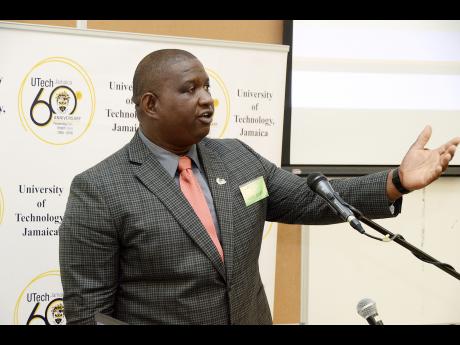Jamaica advised to standardise ganja
Dr Cliff Riley, executive director of the Scientific Research Council, says that while Jamaica likes to boast about its high-quality marijuana, popularly referred to as ganja, there is no precise or settled definition of what that means.
Riley also pointed to a lack of adequate research around marijuana, some of which, he noted is the legacy of cultural practices, but also a basic lack of trust between parties.
The sector needs a change in attitude and a collective drive towards real standards, he told a medical cannabis symposium hosted by the University of Technology Jamaica, July 5-6.
"We need to standardise it. We need to understand it," declared Riley at the opening of JAMECANN 2018 at the UTech campus in Kingston.
"We can't keep telling the world that we have the best ganja. Best ganja for what? Is it the best ganja for smoking? Is it the best smelling ganja? Is it the best ganja for treating autism or for treating glaucoma or asthma? We need to understand what we are talking about and how to use it accordingly," he said.
UNDERGROUND ACTIVITY
Jamaica has slowly been decriminalising ganja, mainly for research and medicinal purposes. The industry is overseen by the Cannabis Licensing Authority, which is the issuing agency for permits for cultivation, retailing of products and other activity.
Before those efforts, activity around ganja was all underground, even though it was often smoked at public functions and some entrepreneurs were known to distribute ganja-based products.
Riley charged that the Jamaican ganja industry continues to be characterised by persons operating on the periphery, and there as an urgent need to dispense with the notion that 'herb is the healing of the nation'.
"We're looking at an industry driven primarily by money. Don't fool yourselves, it is not only about health or healing the nation - it is about business," he said.
But he also noted that Jamaicans are only earning a fraction of what the drug is fetching in the United States.
The SRC head said ganja generated international revenue of US$4.6 billion in 2014 and projected earnings of US$12.8 billion, with 75 per cent being generated in the United States, and that a pound of recreational ganja sells for about US$981 overseas, while in Jamaica it sells for $2,000-$2,500 per pound.
At that rate, Jamaican cultivators are getting only a very small fraction of the money earned in the industry, he said.
JAMAICA MISSING OUT
Speaking at the same symposium, Minister of Industry, Commerce, Agriculture & Fisheries Audley Shaw sounded the same warning that Jamaica is missing out on opportunities, even as more foreign jurisdictions are decriminalising marijuana.
Shaw said other countries are focused the business opportunities available in the development of medicinal marijuana while Jamaica is caught in an ethos of the promotion of ganja for recreational use.
"We have to change our mindset in Jamaica from the spliff mentality and work to bring clinically proven medicine to market," he said, while pointing to the need for collaboration between the Cannabis Licensing Authority and the Ministry of Health in charting the way forward.
"I am committed as the responsible minister to provide the leadership required to mobilise the resources and the personnel required to ensure success. Failure is not an option - Israel is doing it, Germany is doing it, all over Europe they are doing it, and the United States has been studying it for 10 years," he declared.
As to the apprehension among small farmers that they could be sidelined, Shaw said pragmatically that large players are needed for their capital input, while noting that small players can get their due through collaboration.
He cited successful partnerships in Jamaica's poultry and potato agro-industries as potential models for the ganja sector.

